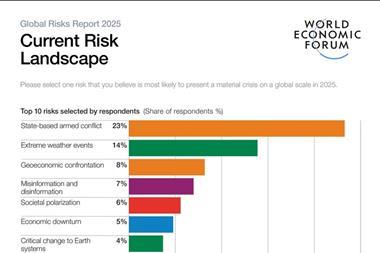Could we be seeing the start of new risk exposures for sectors that have embedded hybrid working practices?
A version of this article previously appeared in our sister publication, Insurance Times
What happened?
Businesses are facing a looming workplace stress crisis despite a widespread move to hybrid working, which seems to have done little to ease employees’ concerns.
A study published last month by digital payment provider Equals Money found that 82% of UK workers said they suffer from physical pain due to their stress levels at work.

It also found that the majority (88%) of office workers suffer from some form of physical pain at work, such as back, neck or joint pain. Meanwhile, over a third (36%) claimed that pain distracts them from their job.
Over 1,500 workers were questioned for the report, with 90% saying they felt stressed at work and a further 18% saying this stress was constant.
What does it mean for risk managers?
The study’s findings create a growing issue for employers – and their risk managers.
Exactly, 60% of respondents revealed that workplace stress had caused them to take time off, while three quarters (76%) said workplace stress has made them want to look for a new job.
For businesses of all sizes, the move to a hybrid system is now ingrained. The view has been that, for staff at least, the ability to work from their home would reduce issues around stress and increase productivity.
“The latest study seems to back the concerns of many that hybrid working may come with new risks – and therefore new exposures for businesses.”
However, there have been growing concerns that staff fears of being viewed as not working hard enough are making them extend working hours – therefore increasing stress levels.
A shift to home working has also seen staff no longer able to access the support services and equipment that had been taken for granted prior to the pandemic.
The ability of managers to assess the wellbeing of their teams is also reduced by the use of video meetings, which are far from as effective as those conducted in person.
The latest study seems to back the concerns of many that hybrid working may come with new risks – and therefore new exposures for businesses.
What next?
Risk managers working for firms that have adopted hybrid working must ensure that associated mental health concerns are on the risk register.
This means working closely with HR teams to ensure that mental health remains a top priority. In the current global recruitment crisis, acting now on mental health could have a serious knock on effect on the attraction, retention and motivation of key staff,
Risk managers should also be aware of related risks from hybrid working, such as cyber exposures.
A poor risk management strategy could lead to loss of working hours, business continuity and reputational damage. In fact, Aviva’s Risk Insight Report 2021 identified mental health issues within the top ten major risks faced by businesses.




















No comments yet